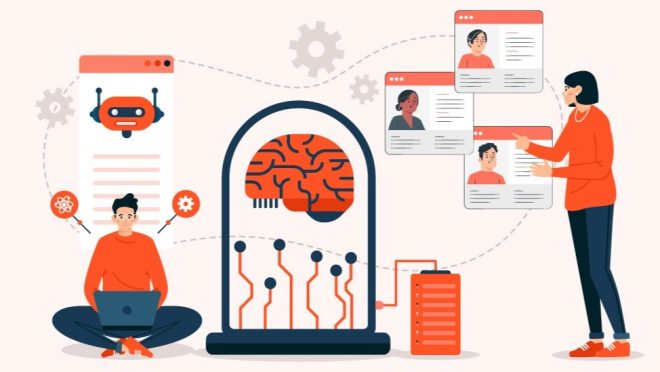The future of Strategic Management in the AI Era
The future of Strategic Management in the AI Era

With the constant development of artificial intelligence, it is transforming decision-making processes, reinventing business models, and changing sectors. This phenomenon is also applicable to strategic management, being a crucial activity for any firm’s expansion and longevity.
Businesses in Bangladesh need to rethink conventional approaches if they want to be competitive and thrive in an increasingly dynamic environment.
The integration of AI in Strategic Management
AI has a much broader implication for strategic management than just efficiency and automation. It gives the power of real-time insight from big databases to decision-makers, allowing businesses to map out future changes in the market and take necessary measures beforehand. AI offers Bangladeshi companies unparalleled opportunities to enhance decision-making and accelerate processes, especially in the fast-growing sectors of manufacturing and textiles.
For instance, predictive analytic allows companies to forecast financial performance with unprecedented accuracy, optimise supply networks, and anticipate customer behavior. These capabilities drive down risks and enhance the accuracy of data-driven tactics. AI-driven forecasting can effectively manage inventory, reduce waste, and meet rapidly shifting global demand in Bangladesh’s apparel sector. Similarly, healthcare providers can fill gaps in rural health infrastructure by leveraging AI to forecast patient needs and improve service delivery.
Competitive analysis also continues to change with the help of AI technologies, such as ML algorithms and NLP. Therefore, companies in Bangladesh are able to keep track of export market trends, investigate the actions of rivals, and identify new opportunities arising within international marketplaces. This type of insight encourages creativity and agility since it supports informed judgment. For instance, AI can be used by export-oriented firms to forecast demand in different geographic areas and adjust their plans accordingly to maximize development prospects.
Redefining leadership and organisational culture
There needs to be a paradigm shift in leadership in the era of AI. In Bangladesh, strategic executives need to don a tech-savvy state of mind that makes their companies not only aware but also prepared for AI. This requires creating an environment where learning never stops and where staff members are motivated to use AI technologies for strategic assignments.
Leaders also have to focus on skilling employees. Since AI is continuously changing the job responsibilities and workflow, employees must be equipped with the right skills to work with the AI systems. In addition to this cultural change, the leadership has to support resilience and flexibility at all levels of the organisation. Targeted training programmes and collaboration with educational institutions could be a possible remedy for Bangladesh, where higher technical education might not be available or accessible in rural areas.
Ethical issues, therefore, are increasingly part of strategic management while applying AI. Leaders have to ensure that AI-driven decisions are transparent, accountable, and fair to retain the trust and maintain the brand value of their organization. Compliance with international data privacy regulations and application of ethical AI approaches will be critical to maintain reputation and build trust for Bangladeshi enterprises expading into foreign markets.
Challenges in AI-driven strategies
While AI indeed holds much promise, there are a few difficulties in implementation into strategic management. In this respect, the dangers of biased AI systems, perils in cyber-security, and issues regarding data privacy could be stated as risks. Bangladeshi businesses, in turn, have to pay attention to investing in strong data governance systems and ethical procedures related to AI. For example, export partnerships are continued by avoiding fines for making sure that regulations like GDPR are followed while working with European clients.
Another challenge is the very access to AI technology. Keeping pace with AI innovation alone already requires enormous investments both in infrastructure and human resource development on the part of enterprise operations. The majority of advanced AI solutions would cost so much money that their penetration into Bangladesh’s small business economy would remain very, very low. The cloud AI service and alliance options with pure player AI firms offer rather cost-effective alternatives that potentially break down these entry barriers.
Moreover, organisations often resist the implementation of AI. Workers may feel insecure when using AI tools or be afraid of losing their jobs. Strategic leaders of Bangladesh should dissipate these fears through open communication, retraining programs, and highlighting the benefits of AI integration. The collaboration of the public and business sectors through digital initiatives such as “Digital Bangladesh” could also be very effective in smoothing these challenges.
The road ahead
The future of strategic management in the AI era is fascinating and challenging. The ability of businesses in Bangladesh to leverage the potentials of AI while mitigating its risks would better position them to face the challenges of today’s market. Businesses will be significantly benefited by investments in AI capabilities, be it through new product and service development, optimizing workflows, or improving consumer experiences.
This includes the hybrid approach whereby the analytical capabilities of AI are complemented by human intuition to ensure that solutions are not only data-driven but also creative and relevant to the setting. For example, human managers offer creativity and emotional intelligence in decision-making, striking a critical balance between empathy and rationality, even if AI can digest enormous volumes of data in record time.
The function of strategic management will gradually shift to a broader emphasis on the integration of technology, moral responsibility, and adaptive leadership as Bangladesh gradually reaches middle-income status. It is only those businesses that will survive but thrive in an AI-driven future and set new standards for innovation and success. The only ones who will be leading tomorrow are those who can marry the benefits of artificial intelligence with the creativity of human intelligence to devise durable, forward-thinking, and effective strategies.


